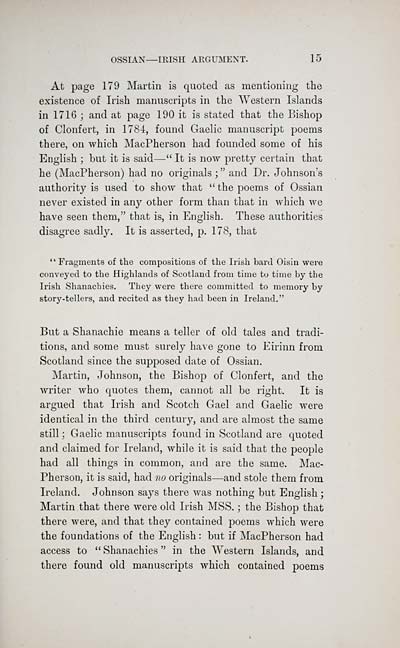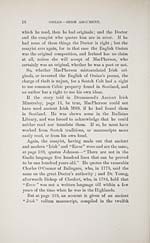Download files
Complete book:
Individual page:
Thumbnail gallery: Grid view | List view

OSSIAN — IRISH ARGUMENT. 15
At page 179 Martin is quoted as mentioning the
existence of Irish manuscripts in the Western Islands
in 1716 ; and at page 190 it is stated that the Bishop
of Clonfert, in 1784, found Gaelic manuscript poems
there, on which MacPherson had founded some of his
English ; but it is said — " It is now pretty certain that
he (MacPherson) had no originals ; " and Dr. Johnson's
authority is used to show that " the poems of Ossian
never existed in any other form than that in which we
have seen them," that is, in English. These authorities
disagree sadly. It is asserted, p. 178, that
" Fragments of the compositions of the Irish bard Oisin were
conveyed to the Highlands of Scotland from time to time by the
Irish Shanachies. They were there committed to memory by
story-tellers, and recited as they had been in Ireland."
But a Shanachie means a teller of old tales and tradi-
tions, and some must surely have gone to Eirinn from
Scotland since the supposed date of Ossian.
Martin, Johnson, the Bishop of Clonfert, and the
writer who quotes them, cannot all be right. It is
argued that Irish and Scotch Gael and Gaelic were
identical in the third century, and are almost the same
still ; Gaelic manuscripts found in Scotland are quoted
and claimed for Ireland, while it is said that the people
had all things in common, and are the same. Mac-
Pherson, it is said, had no originals — and stole them from
Ireland. Johnson says there was nothing but English ;
Martin that there were old Irish MSS. ; the Bishop that
there were, and that they contained poems which were
the foundations of the English : but if MacPherson had
access to "Shanachies" in the Western Islands, and
there found old manuscripts which contained poems
At page 179 Martin is quoted as mentioning the
existence of Irish manuscripts in the Western Islands
in 1716 ; and at page 190 it is stated that the Bishop
of Clonfert, in 1784, found Gaelic manuscript poems
there, on which MacPherson had founded some of his
English ; but it is said — " It is now pretty certain that
he (MacPherson) had no originals ; " and Dr. Johnson's
authority is used to show that " the poems of Ossian
never existed in any other form than that in which we
have seen them," that is, in English. These authorities
disagree sadly. It is asserted, p. 178, that
" Fragments of the compositions of the Irish bard Oisin were
conveyed to the Highlands of Scotland from time to time by the
Irish Shanachies. They were there committed to memory by
story-tellers, and recited as they had been in Ireland."
But a Shanachie means a teller of old tales and tradi-
tions, and some must surely have gone to Eirinn from
Scotland since the supposed date of Ossian.
Martin, Johnson, the Bishop of Clonfert, and the
writer who quotes them, cannot all be right. It is
argued that Irish and Scotch Gael and Gaelic were
identical in the third century, and are almost the same
still ; Gaelic manuscripts found in Scotland are quoted
and claimed for Ireland, while it is said that the people
had all things in common, and are the same. Mac-
Pherson, it is said, had no originals — and stole them from
Ireland. Johnson says there was nothing but English ;
Martin that there were old Irish MSS. ; the Bishop that
there were, and that they contained poems which were
the foundations of the English : but if MacPherson had
access to "Shanachies" in the Western Islands, and
there found old manuscripts which contained poems
Set display mode to: Large image | Transcription
Images and transcriptions on this page, including medium image downloads, may be used under the Creative Commons Attribution 4.0 International Licence unless otherwise stated. ![]()
| Early Gaelic Book Collections > Matheson Collection > Popular tales of the west Highlands > Volume 4 > (31) |
|---|
| Permanent URL | https://digital.nls.uk/81487429 |
|---|
| Description | Volume IV. |
|---|---|
| Shelfmark | Mat.77 |
| Additional NLS resources: | |
| Attribution and copyright: |
|
| Description | Items from a collection of 170 volumes relating to Gaelic matters. Mainly philological works in the Celtic and some non-Celtic languages. Some books extensively annotated by Angus Matheson, the first Professor of Celtic at Glasgow University. |
|---|
| Description | Selected items from five 'Special and Named Printed Collections'. Includes books in Gaelic and other Celtic languages, works about the Gaels, their languages, literature, culture and history. |
|---|

